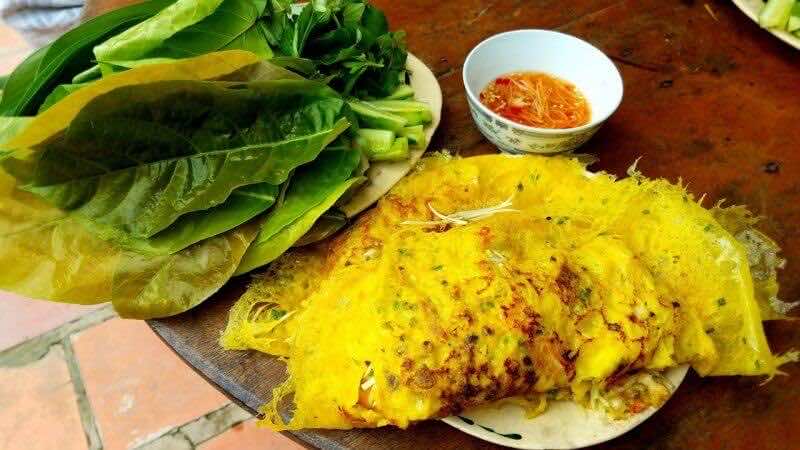Vietnamese pancake – banh xeo – is one of the most popular dishes in Vietnam. Because of geographical differences in cooking styles and spices in Vietnam, banh xeo can have many different regional interpretations. Large or small, the round, savory crepes get their name from the sound of rice flour sizzling on a hot pan – banh xeo literally means “sizzling cake”. And showcase a range of local ingredients depending upon the region it’s served. Though it’s unclear when these tasty pancakes first came into existence, most agree that the original banh xeo hailed from central Vietnam. Southern, Northern, or Central style banh xeo all have different variations to meet local tastes.
Banh xeo is a crepe made from rice flour and coconut milk colored with turmeric and packed with a standard filling of mung bean paste, shell-on prawns, bean sprouts, and slices of boiled pork. The batter gets evenly spread across a large piping hot wok with a generous amount of oil, creating a crispy exterior that is folded in half when fully cooked. The result is a thin and savory pancake. To enjoy one like a local, cut it into manageable slices, roll it up in rice paper or lettuce leaves and dunk it in whatever special sauce the chef has mixed up to you. The size of banh xeo varies throughout the country as well, and the biggest version can be found down south, in Saigon.
1.Banh xeo in Saigon, Mekong Delta – the biggest version
Some wonder about the difference between the pancakes in the central Vietnam and in the Mekong Delta. The distinction is the size: the cake of the Mekong Delta is much larger than that in the central region. In addition, the pancake in the central region is set in a mold, while the pancake in the Mekong Delta is set in a large pan. The batter get evenly spread across a large piping hot wok with a generous amount of oil, creating a crispy exterior that is folded in half when fully cooked. The result is a thin and savory pancake.
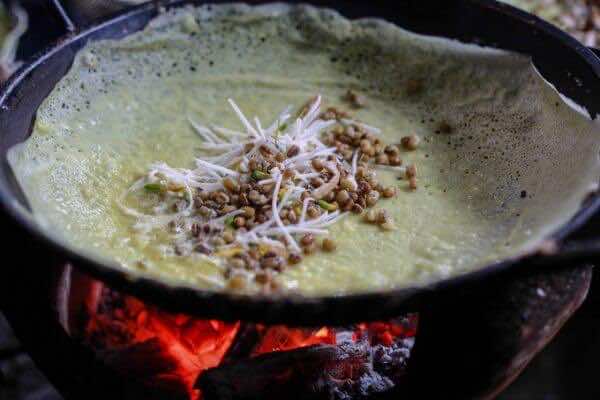
The attractiveness of the Mekong Delta pancake is the thin crispy. When enjoying this dish, you will feel pieces of banh xeo melt right in your mouth. Fillings are varied depending on each region but in Mekong Delta, it includes bean sprouts, mushrooms, shrimp, pork, chicken meat, chopped duck meat…
The most notable part of the meal is the basket of herbs. The herbs will be the wrapper of your banh xeo. Using the lettuce leaf as base, add the mustard leaf next, then layer in on all the remaining herbs like Thai basil, mint. There’s also fish mint in the batch, an herb that has a wonderously bizzare fishy taste. Particularly, the pancake made from the mountain in An Giang use the best mountain vegetables. After you have your make shift veggie vessel, plop a piece of the banh xeo on top and roll it up like a mini spring roll. Dip the roll into the fish sauce and enjoy.
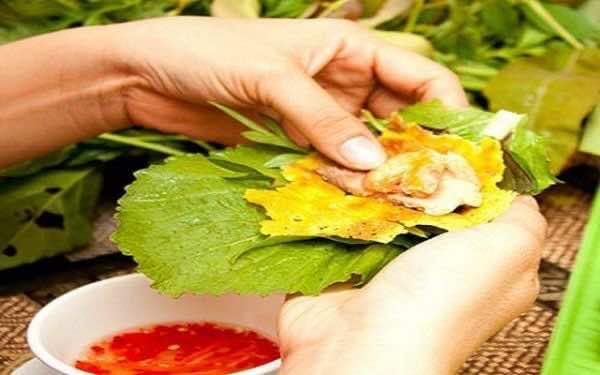
Because of the biggest size of this version, you should share your meal with your friends. Do not try to tackle this beast all by yourself because everything from slicing to the wrapping is best experienced when done in a group. This is the time for everyone to gather together.
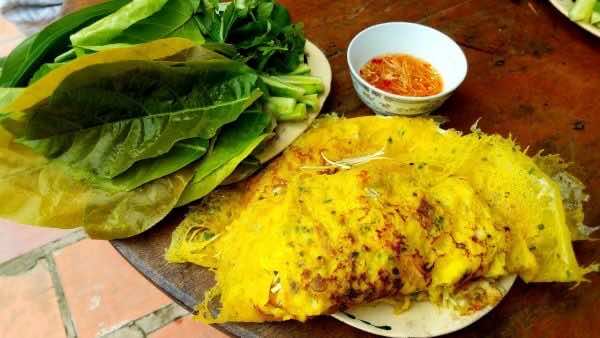
2.Banh xeo Phan Rang
Banh xeo in Phan Rang is absolutely different from the one in Southern part. The cake is in small shape and thin ground rice.
Banh xeo Phan Rang sticks to the traditional banh xeo ingredients like pork, prawns, and bean sprouts – but goes one step further than its other Phan Rang contemporaries in the sauce department. Specifically, the accompanying condiment combines the salty goodness of fish sauce, chili for spice and a bit of tomato to give the whole thing a bit of acidity. What is more, banh xeo Phan Rang’s difference from others is peanut sauce – in this case, a light, subtly sweet and slightly watery concoction.
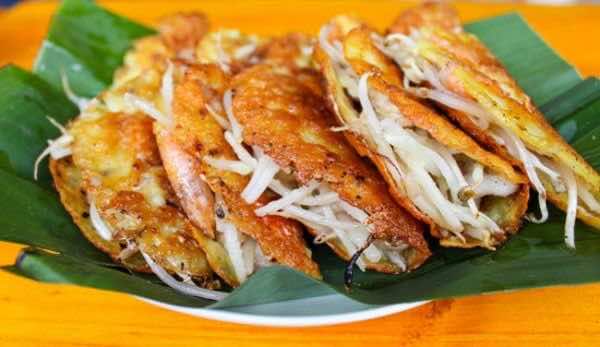
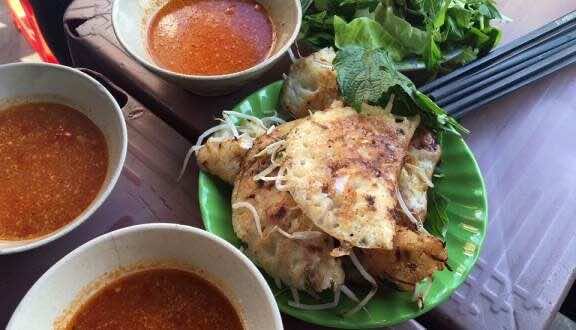
3.Banh xeo Hoi An
In addition to the well-known title of “ancient town”, Hoi An is also known as “the heaven of Vietnamese cakes”. There are many different types of cakes you can try here. One of the specialties is Hoi An’s version of Vietnam’s most famous pancakes – banh xeo.
Like eating banh xeo in Saigon, banh xeo Hoi An is best eaten when it is hot and fresh out of the pan. If banh xeo Saigon is loved because of the spicy fish sauce and the lettuce leaf rolling paper, then Hoi An’s version is proud of its peanut sauce and the fresh herbs from Tra Que, the vegetable village in the area. The chewiness of moist rice paper and crunchy banh xeo blended together, combined with the greens and the creamy, nutty sauce will create a taste explosion in your mouth.
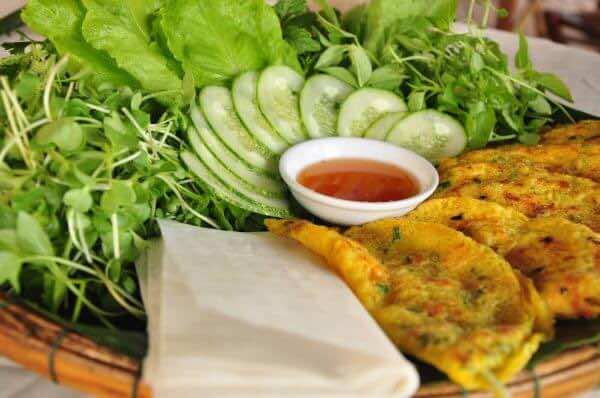
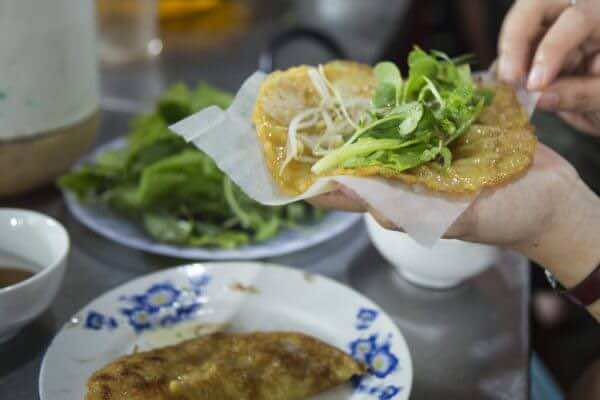
4.Banh xeo in the North
In the Southern region, the banh xeo is the size of a large dish and yellow in color due to the employment of turmeric powder. The Southern people always add coconut milk, mushrooms or even lotus into the pancakes to make the crepe extra delicious. In some regions, banh xeo is prepared thick, but Southern crepes are characteristically thin, crispy and served fresh out of the frying pan. The secret to extra-thin crepes is a deep frying pan and a quick wrist to coat the frying pan with the batter before it start to set.
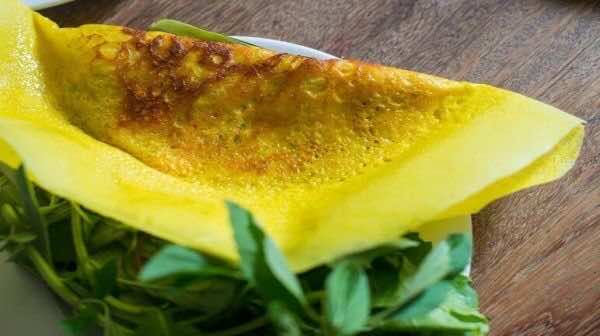
As more central Vietnamese arrived in Saigon, food carts popped up on street corners serving the savory pancakes, which were a decidedly cheap meal, reserved solely for working class. As more affluent Saigonese and Hanoians found out about the dish, however, banh xeo eventually worked its way onto restaurant menus. Banh xeo is positively unlike any other pancake you have tried before. When enjoying in Vietnam, perhaps you cannot ignore the opportunity to try banh xeo, and then it will bring you unforgettable and interesting experience.

